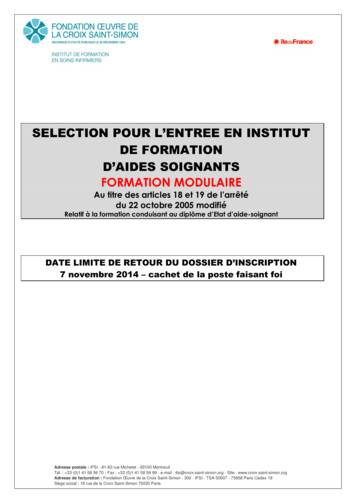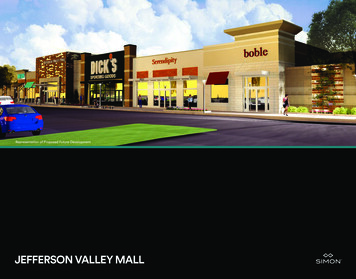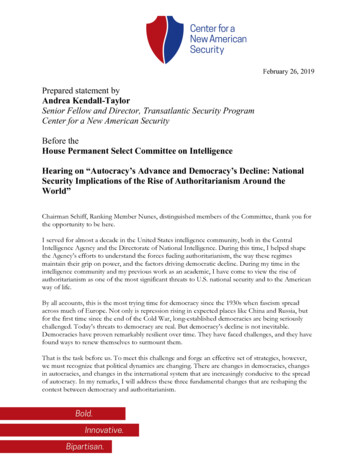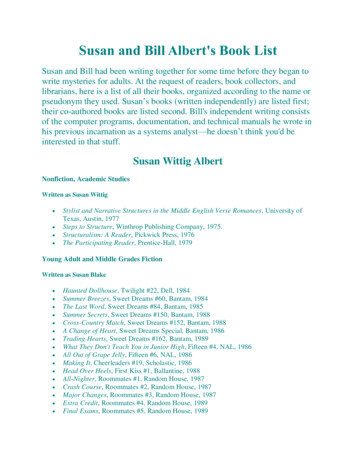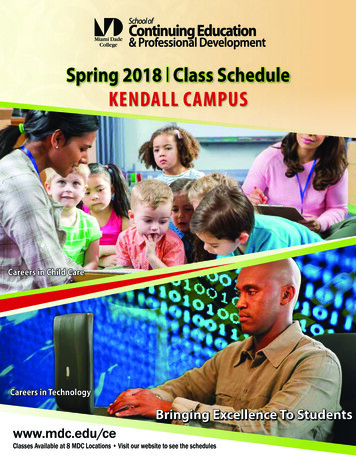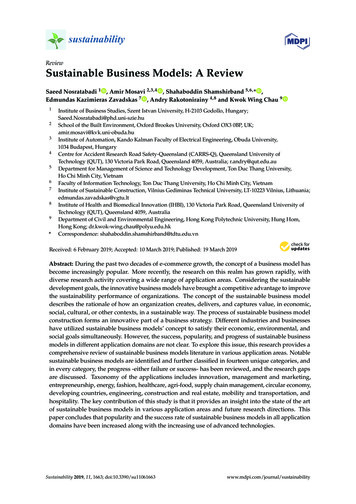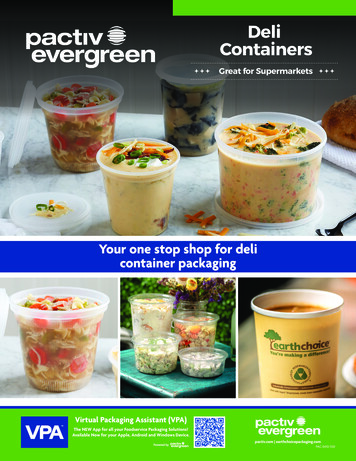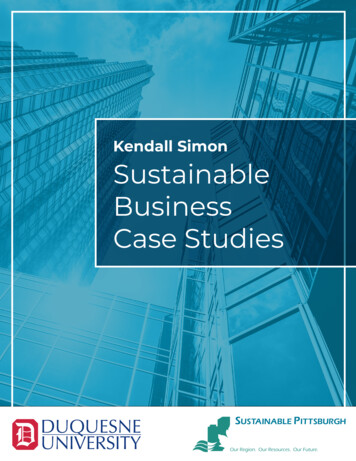
Transcription
Kendall SimonSustainableBusinessCase Studies1Our Region. Our Resources. Our Future.
Table of ContentsBuilt to Last. . . . . . . . . . . . . . . . . . . . . . . . . . . . . . . . . . . . . . . . . . . . . . . . . . . . . . . . . . . . . . . . . . . . . . . . . . 4Integrated for Impact. . . . . . . . . . . . . . . . . . . . . . . . . . . . . . . . . . . . . . . . . . . . . . . . . . . . . . . . . . . . . . . . . . .5FedEx Ground: Embedding Sustainability Within Global Supply Chains . . . . . . . . . . . . . . . . . . . . . . . . . . . . .6Get Started. . . . . . . . . . . . . . . . . . . . . . . . . . . . . . . . . . . . . . . . . . . . . . . . . . . . . . . . . . . . . . . . . . . . . . . . . .162
In Memory of Kendall SimonKendall Youngblood Simon, who passed away in 2014, was an MBA student atthe Joseph M. Katz Graduate School of Business at the University of Pittsburgh.Kendall had a passion for corporate social responsibility and sustainability issues,and was a BNY Mellon Corporate Social Responsibility Fellow through the DavidBerg Center for Ethics and Leadership. Additionally, she was part of the planningteam for the ethics-focused Katz Invitational MBA Case Competition. This series ofcase studies carries on her legacy and shares knowledge to improve business practices.About the SponsorsThe case studies on sustainability in the Pittsburgh region are offered through a partnership between the MBASustainable Business Practices Program at Duquesne University’s Palumbo-Donahue Graduate School ofBusiness and Sustainable Pittsburgh.The project would not be possible without the support of the BNY Mellon Foundation, BNY Mellon, andUPMC.About the Duquesne UniversityMBA Sustainable Business Practices ProgramThe Duquesne University MBA Sustainable Business Practices Program is a globally top-ranked MBA programin the business of difference making. Its students and business partners are at the core of everything. To buildstronger external partnerships, the program enhances connections among Duquesne’s faculty, centers ofexcellence, academic programs and hands-on learning experiences. Doing so helps to seize opportunities tosolve important business and community challenges. The MBA Sustainable Business Practices Program’scorporate and community partnerships deliver transformative value and those who work with the faculty andstaff gain insights from the next generation of business professionals. Businesses and organizations are invitedto tap into the talent and knowledge of these MBA students, who work on identifying, researching, proposingand/or implementing solutions for real business problems faced by partner organizations.About Sustainable PittsburghSustainable Pittsburgh is a 501(c)(3) nonprofit whose mission is to empower decision-making that builds afundamentally equitable, resilient, healthy, and prosperous region. The organization works with hundredsof organizations, universities, communities, local governments, and businesses (ranging from mom and popshops to global companies) on a range of projects to advance policy, share expertise, and strategically buildprofessional networks that advance collective impact. Sustainable Pittsburgh envisions a thriving region wherestakeholders are connected, sustainability knowledge is shared and applied, and all people can succeed.3
Built to LastDr. Joylette Portlock, Executive Director,Sustainable PittsburghFor many businesses, the word sustainability is about operational efficiency, supply chain management,and risk management. But if you consider what it means “to sustain,” to build something ina way that will last, you quickly realize that true sustainability must be about more. It is acomprehensive, ongoing commitment to support a healthy, engaged workforce, build vibrantcommunities in which to do business, and advance environmentally responsible practices.Sustainability is a process of continual improvement, exemplified by businesses that setgoals, self-assess over time, and course-correct where needed. Working with businessesand other organizations, Sustainable Pittsburgh has a number of initiatives that provideresources and expertise to help advance sustainability goals and promote a thriving region.For instance, the CEOs for Sustainability executive roundtable demonstrates unique influenceand visionary perspective on sustainability. FedEx Ground has been a leader in this group, which ishosted by Sustainable Pittsburgh, since its genesis. As you will read in these pages, member organizationsrecognize the powerful potential of sustainable business practices – for strategic innovation, communityengagement, and environmental impact, as well as top- and bottom-line growth. The group provides practicalleadership for all sectors of the business community, encouraging all organizations in their sustainabilityjourney. Learn more about current initiatives of the group at CEOsforSustainability.org.“[Sustainability] is acomprehensive commitmentto support an engagedworkforce, build vibrantcommunities, and advanceenvironmentally responsiblepractices. ”Sustainable Pittsburgh offers many programs for businessesacross sectors to learn and advance their sustainability practices,while providing a framework to track environmental, social, andgovernance performance. We convene forums for peer-to-peerassistance and recognition; and our strategic partnerships bringincreasing numbers of regional entities to the table as valuedpartners in advancing sustainability policies and practices.As I reflect on the urgent sustainability challenges before us, Iam confident that the work described in these pages is criticaland serves as an example, from energy innovation to diverse,inclusive workforces, and collaboration for measurable impact. FedEx Ground has been a true leader. We arepleased to publish this case study as an example of, and inspiration for, continued sustainability achievementin our corporate sector.4
Integrated for ImpactDr. Robert Sroufe, Murrin Chair of Global Competitiveness,Institute for Sustainable Business Innovation, MBA in SustainableBusiness Practices Program; Duquesne UniversityCorporate leaders across industries are well aware of the accelerating rate of change in sustainablebusiness performance. Millennials and others want to work for and engage companies that cantell a different story about their products, services, and operations. Hidden for too long, thevalue of sustainable business practices is now more evident.In this case study featuring FedEx Ground, we find impacts from global logistics on growth,efficiency, people, business, and society. Leadership focused on impact, collaboration, andpartnerships provides strategic alignment with the Sustainability Accounting StandardsBoard and the United Nations Sustainable Development Goals. Investments in sustainablesupply chain management have multiplicative benefits driving change toward integratedbottom-line performance.The achievements of FedEx Ground can get us thinking about sustainability in new ways. We can learn a lotfrom this company and others as we push the bounds of the evolving sustainable business frontier.Introducing more sustainable business practices into management is the key driver of innovation and impactin progressive companies. The integration of sustainability can be found in general management, humanresources, supply chain management, strategy, information systems, and environmental managementfunctions going back decades. While reducing risks and highlighting opportunity, the checks and balances forprudent management can be also baked into a strategy for synergy and growth.What can be done, then, by individuals, functions, organizations, value chains, and even whole citiesto integrate and align sustainability? By showcasing enterprises already involved in the integration ofmanagement practices and strategic sustainable development,“Integrating more sustainable this case study helps reveal the opportunity we each haveto enable an enterprise value proposition that includesbusiness practices intoenvironmental, social, and governance performance.management is the key driverof innovation and impact.”In this region, the champions of business innovation suchas Sustainable Pittsburgh, Duquesne University’s Institutefor Sustainable Business Innovation, MBA Sustainable Business Practices program, and many others, arecontinually working toward finding and prioritizing more sustainable business practices. Reach out to see howwe can help your enterprise.5
Case StudyFedEx Ground:Embedding Sustainability WithinGlobal Supply ChainsAs operations matured, the transportation company discovered thatadopting sustainable practices is an effective strategy for scaling reachwhile minimizing cost.Search, decide, click, and in a few days (or maybe hours), what once appeared as a digital image on a screen istransformed into something real on your doorstep. Magic.But it’s not really, of course. It’s the extraction of raw materials from the earth. It’s the manufacturing andrefining of these materials into containers and fuel. It’s the coordination of ships, trains, and trucks worldwide.It’s the logistics of loading, sorting, and unloading millions of packages on a daily basis in buildings measuredin square miles. It’s the independent service providers under contract with FedEx Ground safely operatingiconic white box-shaped trucks with the purple and orange logo that deliver packages to your door.Every time you order something online, thousands of businesses and teams work through a complexinfrastructure of energy systems, information systems, sortation systems, and transportation systems. It’s allcoordinated to make your delivery seem like magic.Building a Business Based on InnovationIn 1985, a startup quietly revolutionized the ground shipping industry with the 33 black lines we know asa barcode. Barcodes had been used to track inventory in other industries since the 1950s, but it wasn’t untilinnovators at Roadway Package System (RPS) realized what the technology could do for the small-packageshipping industry that the business really took off. With barcodes, a package could be sorted and trackedautomatically, getting it to its destination more efficiently. Billing could also be more accurate, ensuringthat each step of the transportation and delivery process wasproperly tracked and invoiced.investing in new facilities“Byand emerging technologies,FedEx Ground has increased itscapabilities and solutions, whileimproving its environmentaland social sustainability."Through the 1990s, RPS continued to innovate and growby leveraging its unique strengths: a network of operatingfacilities that utilized the latest sortation and materialhandling technology, a delivery force of exclusivelyindependent contractors, flexible pricing, and unmatchedpackage tracking information for customers. By 1993, thecompany exceeded 1 billion in annual revenue — the fastest growth of any ground transportation companyin history.1 RPS was acquired by FedEx Corporation in 1998 and rebranded as FedEx Ground in 2000. Thisacquisition enabled the offering of a powerful portfolio of new services that would expand revenue as online1“About FedEx.” FedEx.com, line/history/opco-ground/, accessed October 3, 2019.6
retail gained popularity. The consumer was no longer concerned with the location of a retailer, as FedExGround could deliver a purchase right to their door.Employees are important enablers of change at FedEx Ground and within the entire FedEx enterprise.In recent years, FedEx Ground has continued to optimize its network and advance its service capabilities.2By investing in new facilities and emerging technologies, FedEx Ground has increased its capabilities andsolutions, while improving its environmental and social sustainability performance. The result is one of theindustry’s most automated hub-networks3 and through that, ongoing efforts to improve speed, efficiency,reliability, and safety.As operations evolved and the organization matured, FedEx Ground discovered that adopting sustainablepractices was an effective strategy for scaling reach while minimizing cost. Employees in the field firstidentified the positive impacts of sustainable practices, but leaders at FedEx Ground quickly recognized theopportunity for a more holistic approach. The Sustainability Department, created in 2013, implementedspecific groups, internally known as “Quality Action Teams,” to discover opportunities and initiateimprovements.Employees are important enablers of change at FedEx Ground and within the entire FedEx enterprise. Aroundthe world, 450,000 FedEx team members work to make this one of FORTUNE’s most admired companies inthe world.4 To enhance social sustainability and skill building, FedEx provides employees with training, careerdevelopment, and access to thousands of online courses through its Learning Center, including content onsustainability, energy conservation, and green purchasing. Last year, team members averaged 19 hours oftraining and skill development across various topics.5“About FedEx.” FedEx.com, line/history/opco-ground/, accessed October 3, 2019.“About FedEx.” FedEx.com, line/history/opco-ground/, accessed October 2, 20194FedEx Newsroom. “FedEx Earns No. 10 Spot on the FORTUNE World’s Most Admired Companies List.” 22 Jan. 2019, accessed panies-list/, accessedOctober 2, 2019.5FedEx. “Multiplying Opportunities.” 2019 Global Citizens Report, April 17, 2019, http://csr.fedex.com/pdf/FedEx GCRFINAL 4.17.19 144dpi.pdf, accessed October 2, 2019.237
FedEx Ground’s greatest environmental impact exists in its shipping activities. It continually seeks new ways to maximize efficienciesand reduce carbon emissions.With the global expansion of e-commerce, FedEx Ground expanded operations from five to six days per weekin late 2018,6 a direct response to the growth of residential e-commerce deliveries. Since 2005, the companyhad been building capacity for this growth, opening 15 new hubs and for the past five years, FedEx Groundhas added nearly 36 million square feet to its network.7 In May 2019, the company announced plans to expandresidential ground delivery to seven days per week in 2020 for the majority of the U.S. population.8Making Sustainability an Integral StrategyTransforming sustainability principles into established practices did not happen overnight. The team at FedExGround grew because of the company’s need to consolidate the ad hoc projects and nascent ideas that wereemerging throughout the organization. Its culture allowed good grassroots ideas to arise from any level withinthe corporate structure. However, the lack of a central organizing body led to some efforts being duplicatedacross departments while other ideas were overlooked. In the Sustainability Department, the organizationcreated a cross-functional team that collaborated across the entire business, driving cost savings, implementinginnovative projects, and improving its environmental impact and strategic management.Over time, the Sustainability Department has become an integral part of the management structure at FedExGround. In fact, teams dedicated to progress have proven key to the success of sustainability initiatives inleading multinational companies.9FedEx Newsroom. “FedEx Ground Expands U.S. Operations to Six Days Per Week Year-Round.” 12 Sept. 2018, /, accessed October 2, 2019.6FedEx. “Multiplying Opportunities.” 2019 Global Citizens Report, April 17, 2019, http://csr.fedex.com/pdf/FedEx GCRFINAL 4.17.19 144dpi.pdf, accessed October 2, 2019.78Berman, Jeff. “FedEx Ground to launch seven day a week residential.” Logistics Management, May 30, 2019, https://www.logisticsmgmt.com/article/fedex ground to launch seven day a week residential delivery by january 202, accessed October 2,2019.See for example, Sroufe, R. (2017) “Integration and Organizational Change Toward Sustainability”, Journal of Cleaner Production,v162, pp 315 – 329.98
The FedEx Ground Sustainability Department is working toward ambitious goals within four focus areas:1.2.3.4.waste reduction and recycling,energy efficiency throughout operations,alternative fuel offerings at fuel islands, andsourcing/onsite at FedEx Ground facilities renewable energy opportunities.To support transparency and improve accountability, FedEx’s goals and benchmarks are made available to thepublic through the annual FedEx Global Citizenship Report.FedEx Ground’s greatest environmental impact exists in its shipping activities. Fuel for transportationrepresents most of the FedEx corporate emissions footprint.10 The FedEx Ground Sustainability team,engineers, and company management continually seek new ways to maximize efficiencies and reduce carbonemissions, while working with internal Quality Action Teams to develop innovative solutions.While the Sustainability Department is focused on meeting the company’s immediate sustainability objectives,longer term targets for 2025 and 2030 are kept in mind in all decision making. Reducing emissions in allaspects of their operations makes good business sense. Emissions reduction can lead to reduced operationalcosts, which promotes company-wide efficiencies and cost savings. Likewise, customers are demanding moretransparency into their partners’ sustainability metrics to ensure they are working with companies that have apositive social and environmental impact. Lastly, investors are favoring companies that take actions to reducecarbon emissions. The sustainability team is focused on responding to these and other stakeholder pressures."Since its 2016 fiscal year, FedExhas invested over 200 millionin more than 250 communitiesaround the globe."Looking to the future, FedEx Ground will continue itsefforts to improve sustainability within its primary business.In particular, the focus is on increasing the availability ofalternative fuels at FedEx Ground fuel islands, continuingto incorporate energy-efficiency measures at FedEx Groundfacilities, and increasing the number of solar installations at sortation centers. These efforts help reducegreenhouse emissions and operating expenses, advance renewable energy goals, and demonstrate industryleadership.Beyond FedEx Ground, FedEx Corporation focuses on emissions reduction — not only in groundtransportation, but also in aircraft efficiency — with the goal of reducing aircraft emissions intensity by 30percent by 2020 (using a 2005 baseline) and increasing the supply of jet fuel from alternative sources to 30percent by 2030.11 Additionally, FedEx Corporation has expanded its scope beyond logistics and transportationto initiatives that enhance communities. Since its 2016 fiscal year, FedEx has invested over 200 million inmore than 250 communities around the globe.12 The goal was to build on its long history of supporting thecommunities in which it operates with a focus on addressing social challenges.Overcoming ChallengesDeveloping and implementing new projects is no small feat within any organization, but the FedEx Groundbusiness model calls for different processes to increase the number and impact of certain sustainability10FedEx. “Multiplying Opportunities.”2018 Global Citizens Report, April, 17, 2019, http://csr.fedex.com/pdf/FedEx 2018 GlobalCitizenship Report.pdf, accessed October 2, 2019. GCR 2018 pg. 9FedEx. “Multiplying Opportunities.” 2019 Global Citizens Report, April 17, 2019, http://csr.fedex.com/pdf/FedEx GCRFINAL 4.17.19 144dpi.pdf, accessed October 2, 2019.1112FedEx. “Multiplying Opportunities.” 2019 Global Citizens Report, April 17, 2019, http://csr.fedex.com/pdf/FedEx GCRFINAL 4.17.19 144dpi.pdf accessed October 2, 2019.9
measures. FedEx Ground contracts exclusively with 5,300 service provider businesses for all transportation,pickup and delivery services. Those businesses in turn employ and independently manage more than 105,000drivers, managers and other staff to meet contractual agreements with FedEx Ground.The Sustainability Department provides these service provider businesses information on the benefits ofalternative fuels and alternative fuel vehicle options. However, decisions are ultimately and solely in the handsof each service provider, which may or may not view these opportunities as a current priority for their business.To help guide its efforts, the FedEx Ground Sustainability Department focuses on four pillars that supportsustainability, strategy, and communication. These four pillars — energy efficiency, alternative fuels,renewable energy, and waste and recycling — help to categorize initiatives and align strategic objectives.A number of departments have efficiency built into their projects, but the degree of success depends onthe timing of sustainability discoveries. As the Sustainability Department has grown, every now and thenits team members have been able to gain some insight into additional environmental and social benefits.An opportunity area with this is that the sustainability professionals charged with finding performanceimprovements sometimes find out about them only after the project is completed, instead of at the beginning.Like most efforts to grow the visibility of the Sustainability Department, there is room to work on this.The Sustainability Department’s critical success factors include communication and getting a seat at the tableon larger projects. That ensures the department stays engaged and keeps sustainability on everyone’s radar.Other critical efforts involve tracking and compiling sustainability data related to other departments. Thisis where explicit and implicit Triple Bottom Line (TBL) focus areas can be mapped to the four sustainabilitypillars. Finding TBL impacts and grounded business cases enables the Sustainability Department to assist withjustifying projects across the organization. These top priority, attention-grabbing projects — such as increasingthe percentage of energy generated from renewables every year, modernizing facilities to help supportthe community, and promoting microgrids — are all integrally related to the Sustainability Department’scommunicated goals. It helps when others in the enterprise know that sustainability aligns with strategic efforts.The FedEx Ground Sustainability team is very data driven and purposefully involve engagement acrosslocations. A key to making progress on all levels involves the use of metrics for each of the communicationslevels. The sustainability team pushes to have easily understandable numbers — for example, a bronzeThe FedEx Ground Sustainability Department focuses on four pillars: energy efficiency, alternative fuels, renewable energy,and waste and recycling.10
level facility saves this much in money and energy — and it can use these metrics and costs savings to sellimprovement projects to other FedEx Ground locations.Delivering ResultsRenewable EnergyWith the use of Power Purchase Agreements (PPAs), the team has successfullyinstalled solar energy systems at a number of facilities. PPAs are financial agreementsin which a developer arranges for the design, permitting, financing, and installationof a solar energy system at little to no initial cost and then sells energy generated bythe system to the purchaser at a fixed yearly cost over the contract period. Utilityincentives, rate savings, geographic location, and facility size and ownership aredata points the sustainability team then uses to determine where and when to installadditional solar systems.Energy EfficiencyFedEx Ground also takes advantage of programs with utility vendors to completelighting retrofit/building energy-efficiency projects through negotiated utilitypricing and no upfront capital investment. Programs like these provide an incentiveto undertake LED lighting retrofit projects, and they provide the benefit of sharedsavings with utility companies. Costs of efficiency projects are factored into themonthly bill during the agreed upon term of the agreement. The projects reduceenergy use, resulting in a more effective load profile for the utility system andreduced energy costs for FedEx Ground. What’s more, at the conclusion of thecontract period, FedEx Ground retains ownership of the installed equipment,demonstrating the ongoing strategic benefits of such sustainability programs.Waste Reduction and RecyclingWaste reduction is an area of perpetual improvement. Perhaps more than any otherarea in sustainability, waste reduction benefits from advancements in data collectionand analysis. Rather than working from data collected from a single building andvendor, FedEx Ground can now synthesize information from all FedEx Groundfacilities and can organize operations and offerings based on data points collectedfrom various waste and recycling vendors. The Sustainability Department is currentlyworking with external vendors to consolidate services, improving decisions andpractices on the local and national levels.EngagementOperationally, the FedEx Ground Sustainability team focuses on efficiency, loweringcosts, and lessening waste – and people at every level of the organization play a partin finding these opportunities. To this end, engagement programs are in place tosolicit process-level insights and suggestions. For example, the EarthSmart ChampionProgram was created to promote and support the sustainability strategy and visionat each sortation facility. Goals of the program include increased sustainability11
awareness, employee engagement at the facility and district levels, standardizedsustainability practices, and employee development opportunities. EarthSmartchampions represent each facility, and each geographical district has a championmanaging direct results. One of the champion’s main responsibilities is to leadsustainability efforts at their facility and to complete the EarthSmart BuildingChecklist for their buildings to become certified at the Bronze, Silver, or Gold level.Each facility’s certification level factors in to FedEx Ground’s selection of the mostsustainable district, awarded annually.Each year around Earth Day, FedEx Ground celebrates its environmental performancethrough Ground Green Week, during which nearly 1,500 sustainability-related eventsare held company-wide. The EarthSmart Champion Program, building certifications,annual awards, and celebratory week all help to communicate sustainability efforts,engage employees, and promote internal performance across the company.FedEx Ground’s internal infrastructure and team engagement are key componentssupporting the company’s sustainability efforts. With so many employees to engagein sustainability progress, bottom-up efforts are as essential as top-down initiatives.That’s why the Sustainability Department puts such emphasis on encouragingemployees to be part of identifying and adopting sustainable practices, from packagehandlers to the CEO.CollaborationThe FedEx Ground Sustainability Department enjoys dynamic relationships withmany other businesses in the larger FedEx environment. At the corporate level,the FedEx Enterprise Sustainability Council (FESC) is responsible for setting andimplementing our company-wide sustainability strategy and administering ourCSR materiality assessments. Our Chief Sustainability Officer chairs the FESCand also oversees enterprise-wide Sustainability Impact Teams (SITs) for globalvehicles, facilities, air operations, customer solutions, EarthSmart, data/reporting,and sourcing that allow our operating companies to share synergies, ideas, andinnovations.Each of the four FedEx operating companies — FedEx Express, FedEx Ground, FedExFreight, and FedEx Services — works simultaneously on three levels. First, theyoperate independently by focusing on their independent networks to meet distinctcustomer needs. Second, they compete collectively as one brand worldwide and speakwith one voice. Finally, they manage collaboratively to sustain loyal relationships withthe workforce, customers, and investors across platforms.In this way, FedEx Corporation offers integrated business solutions across operatingcompanies generating total revenues of 70 billion.13 The significance of the operatingcompanies is that FedEx can provide a broad portfolio of services (transportation,e-commerce, business services, etc.) because each operating company is expert atproviding a specific service to address customer needs.FedEx. 2019 10-K http://s1.q4cdn.com/714383399/files/doc financials/quarterly/2019/FedEx-FY2019-10K.pdf, accessedNovember 14, 2019.1312
Partnering for Sustainability LeadershipIn 2014, FedEx Ground enrolled in the Sustainable Pittsburgh Challenge, which provided a platform foremployee engagement and resulted in a first-place finish in the large business category. Teams of employeesat the FedEx Ground headquarters volunteered to take on the competition action items. Local and nationalpartnerships have grown out of these efforts with the Arbor Day Foundation, the National Fish and WildlifeAssociation, Grow Pittsburgh, Grounded (formerly GTECH), Pittsburgh Parks Conservancy, and the GreenBuilding Alliance.FedEx Ground sponsors Grow Pittsburgh’s Urban Farmers in Training Program and its Urban FarmApprenticeship, in which Grow Pittsburgh works with the Braddock Youth Project to employ teens for theUrban Farmers in Training Program. Each summer, six teens are hired at Braddock Farms for eight weeksof hands-on trai
Employees are important enablers of change at FedEx Ground and within the entire FedEx enterprise . Around the world, 450,000 FedEx team members work to make this one of FORTUNE's most admired companies in the world .4 To enhance social sustainability and skill building, FedEx provides employees with training, career


